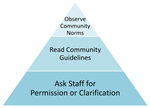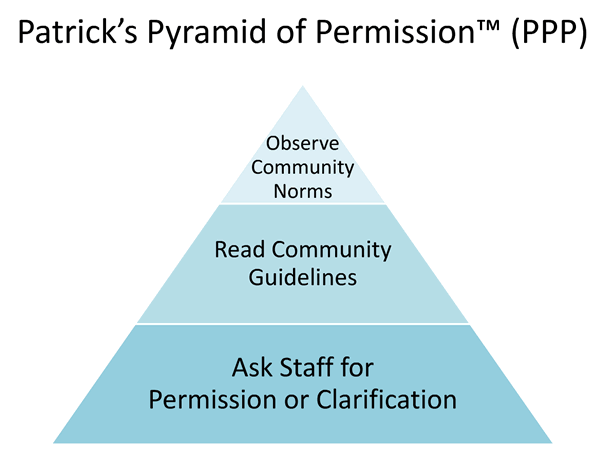Patrick’s Pyramid of Permission™ (PPP) (Something to Check Before Your Company Engages in an Online Community)
 Online communities can be very powerful. When a group of people gather regularly around a topic or interest, especially when that topic or interest is directly related to your company or a product that you sell, an established online community can represent a great opportunity to engage with your core audience.
Online communities can be very powerful. When a group of people gather regularly around a topic or interest, especially when that topic or interest is directly related to your company or a product that you sell, an established online community can represent a great opportunity to engage with your core audience.
That is why a lot of companies try to engage within an online community by joining and “participating.” But, it is sometimes done in a way that actually has a negative effect because the company either tries to blatantly take advantage of the community or, at least, participates in a manner that suggests that is what they are doing.
Online communities and forums are a different beast than more general, mainstream social platforms like Facebook, Twitter and the like. Each online community is like it’s own country, with it’s own culture, laws and societal norms. The backlash that a company can face from disregarding these norms can be painful and that is why a lot of companies are afraid of engaging in these more controlled spaces.
However, it doesn’t have to be that. Previously, I shared my quick and easy guide to company and brand engagement on communities you don’t own and, at a couple of conferences last year, I debuted Patrick’s Pyramid of Permission™ or PPP, for short. Please allow me to introduce you to it.
 PPP distills the process to the 3 most impactful stages of engagement.
PPP distills the process to the 3 most impactful stages of engagement.
First, before you jump in, you should always look. Spend time reading what others have contributed to get a feel for the tone of the community and how people share information. Take a look at some of the most consistent contributors and also members of staff and see how they go about their business. Observe the social norms of the community, so that you can participate similarly and treat other members with the respect that they deserve.
Next, read the community guidelines (or rules or policies). These are your best friend. They detail the types of activities that are encouraged and discouraged on the community. They tell you the type of community it is and should be a reference point for you. You never want to bend, let alone break, the guidelines. You want to be an exemplary citizen. If the community does not have guidelines of any kind, often times, it is not worth engaging in.
Finally, if you are ever unsure on whether or not something is appropriate, you should always, always err on the side of caution and ask a member of staff. It is always better to be safe, than sorry. Plus, generally speaking, the staff will appreciate that you asked first and it will give you an opportunity to build a relationship with them.
If you start at the top of the pyramid and move down, you’ll greatly improve your chances of successful engagement on an online community.
